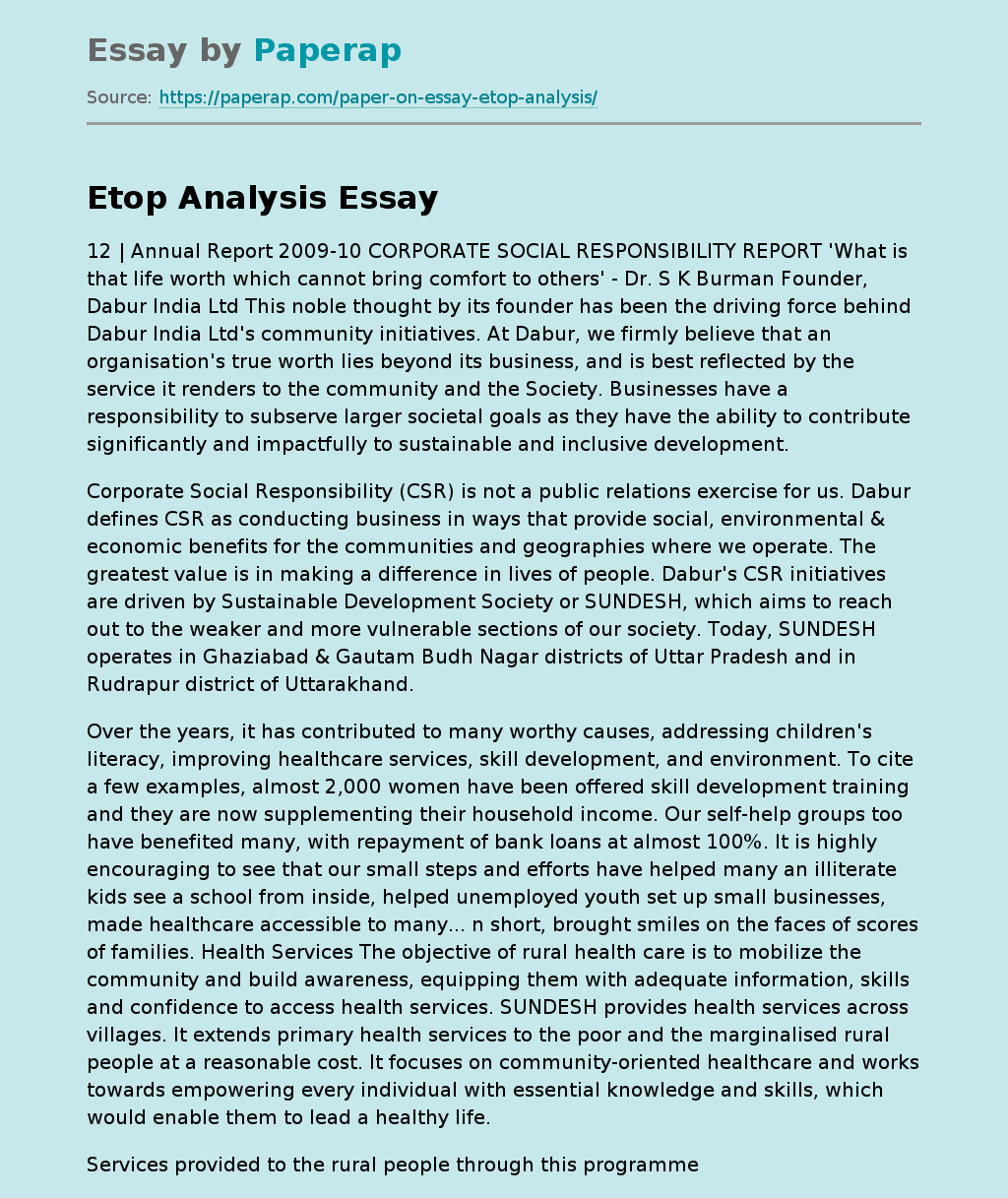CSR Report 2009-10
12 | Annual Report 2009-10 CORPORATE SOCIAL RESPONSIBILITY REPORT ‘What is that life worth which cannot bring comfort to others’ – Dr. S K Burman Founder, Dabur India Ltd This noble thought by its founder has been the driving force behind Dabur India Ltd’s community initiatives. At Dabur, we firmly believe that an organisation’s true worth lies beyond its business, and is best reflected by the service it renders to the community and the Society. Businesses have a responsibility to subserve larger societal goals as they have the ability to contribute significantly and impactfully to sustainable and inclusive development.
Corporate Social Responsibility (CSR) is not a public relations exercise for us. Dabur defines CSR as conducting business in ways that provide social, environmental & economic benefits for the communities and geographies where we operate. The greatest value is in making a difference in lives of people. Dabur’s CSR initiatives are driven by Sustainable Development Society or SUNDESH, which aims to reach out to the weaker and more vulnerable sections of our society.
Today, SUNDESH operates in Ghaziabad & Gautam Budh Nagar districts of Uttar Pradesh and in Rudrapur district of Uttarakhand.
Over the years, it has contributed to many worthy causes, addressing children’s literacy, improving healthcare services, skill development, and environment. To cite a few examples, almost 2,000 women have been offered skill development training and they are now supplementing their household income. Our self-help groups too have benefited many, with repayment of bank loans at almost 100%. It is highly encouraging to see that our small steps and efforts have helped many an illiterate kids see a school from inside, helped unemployed youth set up small businesses, made healthcare accessible to many… n short, brought smiles on the faces of scores of families.
Health Services The objective of rural health care is to mobilize the community and build awareness, equipping them with adequate information, skills and confidence to access health services. SUNDESH provides health services across villages. It extends primary health services to the poor and the marginalised rural people at a reasonable cost. It focuses on community-oriented healthcare and works towards empowering every individual with essential knowledge and skills, which would enable them to lead a healthy life.
Services provided to the rural people through this programme include: OPD & Diagnostic Facilities: The number of patients at the Health Post has been growing substantially every year, reflecting the increasing faith of the rural community in our medical facilities. Till date, 61,628 patients have benefitted through OPD services. It also provides diagnostic facilities like urine and pregnancy test, haemoglobin, blood sugar and doppler test to the poor rural populace at nominal rates. Mother & Child Healthcare: This initiative is aimed at reducing infant and maternal mortality rates, besides improving the quality of life of the villagers.
Given the fact that pregnancy and child-birth related deaths are high in India, SUNDESH is focused on promoting and motivating expecting mothers to go in for institutional deliveries. Dabur India Limited | 13 It is the number of children who have benefitted from our education-related initiatives till date, with 830 children having joined formal schools Eye Care Camps: SUNDESH takes care of the elderly by holding eye care camps at its Health Post and in villages. Cataract cases are even operated free of cost. Prevention of female foeticide: SUNDESH has organised workshops in Ghaziabad on prevention of female foeticide.
Anganwadi workers were sensitized to make the community aware about the importance of girl child and improve the girl-boy ratio in the region. AIDS awareness: An awareness drive on HIV/AIDS was undertaken with CARE India Trust and UP State AIDS Control Society. This sought to reduce Sexually Transmitted Infections/HIV transmission among high-risk migrants in urban areas of Ghaziabad district in Uttar Pradesh. Education & Literacy The educational initiatives of SUNDESH for underprivileged children include nonformal education [6-14 years non-school going], special school for working children [8-13 years], emedial education [6-14 years school-going], besides holding classes for women between the age of 18 and 45 years. This programme’s success is reflected in the fact that a host of mothers are now following their daughters and seeking admission at our adult education centre. Non-formal Education: SUNDESH holds classes for underprivileged children between 6 and 14 years of age. After completing their basic education, these children, who have either never had a chance to see a school from inside or are school dropouts, are then encouraged to get enrolled in formal schools.
Income Generation Programmes Capability enhancement programmes have been introduced offering vocational training in cutting & tailoring, machine & hand embroidery, bee keeping, mushroom farming, mehandi application and vermi-composting. Still a long way to go… Dabur believes in having a long-term relationship with communities in and around its operational area, and in providing sustenance to regions that remain isolated and neglected. A beginning has been made but there are still miles to go before the huge disparity is bridged and a better future delivered to both the rural and urban poor.
CSR Report 2009-10. (2019, Jun 20). Retrieved from https://paperap.com/paper-on-essay-etop-analysis/

